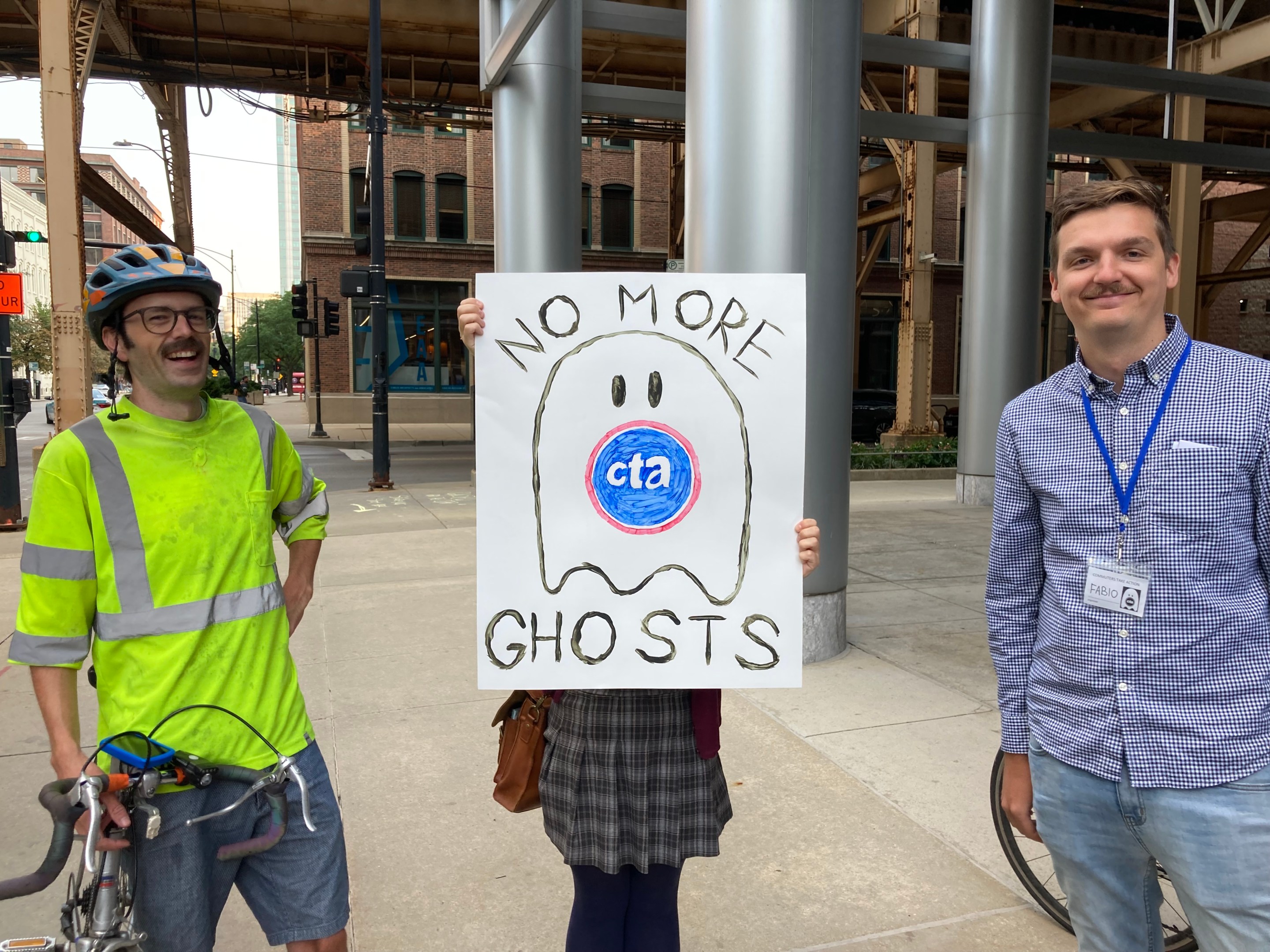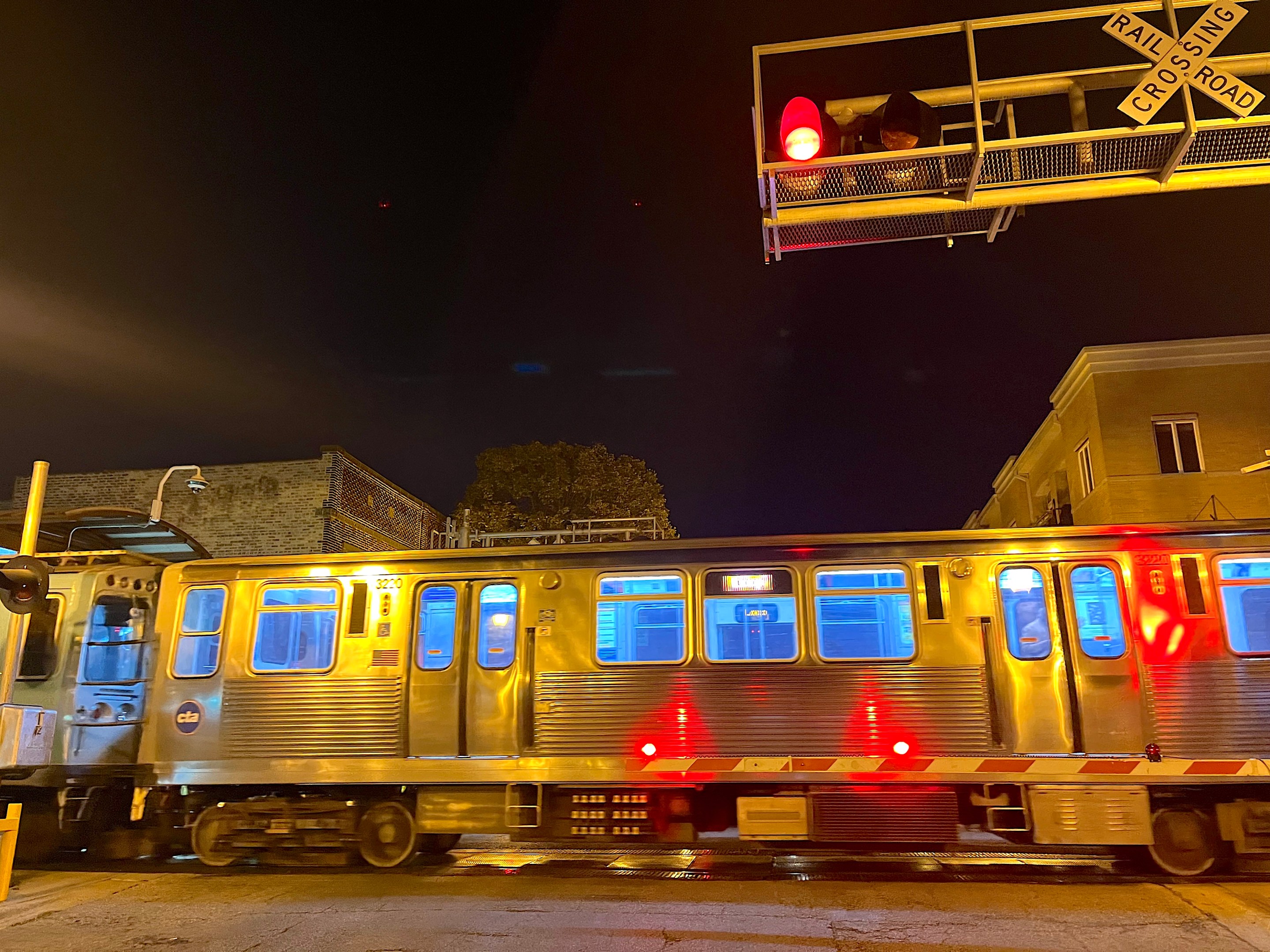
On Halloween, a Crain's editorial did a fine job of summing up the stressful, but ultimately successful, legislative process that led to the Illinois General Assembly passing a robust transit reform/funding bill earlier that morning. "A long night yields long-overdue action on transit" is definitely the best op-ed I've seen on the topic in the mainstream press since last Friday.
Here are a few passages from the Crain's piece that make me want to employ the "100" ("I agree with you 100 percent") emoticon:
• In the final days of the session, there was a very real danger that lawmakers would put off the hard stuff on transit until January. Thankfully, that didn’t happen."
• "The final deal relies on sources that, while imperfect, at least make conceptual sense: diverting a portion of the motor fuel sales tax to transit, dedicating interest from the road fund to infrastructure, and authorizing a modest regional sales tax increase."
• "Illinois deserves credit for facing a problem squarely instead of deferring it. Riders, employers and taxpayers have been demanding action for years. This bill, while imperfect, represents progress — and, perhaps, a sign that Springfield remembers how to deliver it."
In contrast, the Chicago Tribune editorial board's piece on Sunday about the Springfield vote, par for the course for them, took a mostly glass-half-empty view of the legislation. Their piece is titled, "Springfield’s adults in the room averted horrific transit taxes, but we still have questions."

The paper is bitterly opposed to the $0.25 Chicagoland sales tax increase that was approved to fund transit, "which would raise that levy in the city itself to an embarrassingly high 10.5 percent." They argue, "This deal further handicaps Chicago’s desperate need to jump-start economic growth, choked off in no small part by continual threats of new taxes by Democratic leaders at the state and municipal level."
The editorial board also objects to fact the new funding allows the transit systems to avoid raising fares. "The people who actually use the CTA and Metra should have some skin in the game," they argue. "Three dollars a ride [up 20 percent from the current $2.50 for an 'L' ride] to help restore a deficit-hobbled public transportation system feels reasonable to us."
Chicago Trib editorial board comes out against the RTA sales tax increase authorized by the transit reform bill. That increase—$0.25 per $100 purchase—would deliver about half of the planned revenue increase for Chicago area transit = no service improvements. www.chicagotribune.com/2025/11/02/e...
— Thomas Bamonte (@thomasbamonte.bsky.social) 2025-11-02T15:23:19.566Z
"The fiscal cliff, which has been a moving target anyway over the past year, now stands at an estimated $230 million next year, increasing gradually to $937 million in 2028, according to the RTA," the Tribune adds. "So why did the RTA insist it needed hundreds of millions more than that?"
"We worry that we won’t see the service and management improvements that a whopping $1.5 billion ought to be buying for Chicagoland taxpayers," the editorial board pessimistically concludes.
I checked in with transit-friendly lawmakers and advocates who helped make the get the legislation passed, to get their reaction to the Tribune's complaints
"There was an incredible amount of 'Trib-splaining' in this piece that makes me wonder if they actually read the bill," replied House bill co-sponsor Rep. Kam Buckner. "The Tribune fixated on the tax instruments and completely missed the real story: Governance reform, structural accountability, and a regional reset that finally unifies how Illinois funds and manages public transit."
"When law, this will save tens of millions of dollars, but the Tribune didn't bother to delve into that," Buckner said. "It creates a unified regional structure that consolidates planning, data, and procurement across agencies and we aren't taking the service board's word for it; it mandates performance metrics like ridership recovery, safety outcomes and customer satisfaction all tied directly to funding."
"And on their closing line – that this package 'better mean safety and hygiene are dramatically improved' – they might notice the bill funds both transit policing and unarmed safety teams, cleaning contracts, and new lighting and security infrastructure, with annual public reporting on safety and ridership confidence," the representative concluded. "The Tribune editorial board didn’t just miss the fine print; they missed the foundation."
House co-sponsor Rep. Eva-Dina Delgado seemed to agree that the editorial gave short shrift to the benefits the $1.5 billion will provide. "This legislation invests in the transit system Illinoisans deserve – a system that is safe, reliable, and sustainably funded,” se said. "With this bill, we are saying no to kicking the can down the road and bringing an end to an era of patchwork solutions and bureaucratic dysfunction."
Buckner's and Delgado's counterpart Sen. Ram Villivalam, sponsor of the Senate bill, also weighed in. "First of all, we have to remember that the revised fiscal cliff number that was provided included fare increases and cuts to the Rap and TAP program [ride-hail and taxi subsidies for people with disabilities] after the first quarter of next year," he said. "So to me, the revised number including fare increases and cuts to the Rap and TAP program after the first quarter of next year was a non starter. That's always unacceptable. "
"On fare increases, when you talk to people that are riding the system today, they are not satisfied with the service as-is," he added. "Our deliberations and thought process on that was to stabilize the system with funding, transform the system with reforms, and after a year's time, having the new entity that will be in place, [the Northern Illinois Transit Authority], evaluate how fares need to be adjusted. And also couple that with fare capping programs and free- and reduced-fare programs for veterans or returning residents, for survivors of domestic violence, to ensure that, yes, people are paying for the service, and also we're addressing the very real challenge of accessibility for working and middle class families."
Fabio Göttlicher, cofounder of the grassroots transit advocacy group Commuters Take Action (CTAction), said the group is excited and relieved that the transit fiscal cliff has been avoided.

He addressed the Tribune's comment that a 10.50 percent sales tax will be "embarrassing." "Comparing our sales tax (or VAT) rate with other places in the world, Chicago’s ten-ish percent is still low," he said. "Countries like Germany or France with well developed transit systems see VAT rates closer to 20. We think that’s worth it for quality transit. Because quality transit is worth it – it builds communities, supports healthier lifestyles, enables good urbanism and helps our environment."
"We also feel that substantial raises to fares are not the right way to go," Göttlicher added. He noted that the CTA was planning to raise fares by a quarter before the bill passed. "What we’d like to see instead is a heavily discounted yearly pass for Chicago residents to make transit truly accessible to anyone at any time. Many cities around the world have seen success with this."
As for the Tribune editorial board members, they NITA learn to stop worrying and love the new transit bill. Or at least acknowledge that the legislation is going to do a lot of good for our state's economy and livability.
Read the Crain's editorial here.

Do you appreciate Streetsblog Chicago's paywall-free sustainable transportation reporting and advocacy? We officially ended our 2024-25 fund drive in July, but we still need another $42K+ to keep the (bike) lights on in 2026. We'd appreciate any leads on potential major donors or grants. And if you haven't already this year, please consider making a tax-deductible donation to help us continue publishing next year. Thank you!






